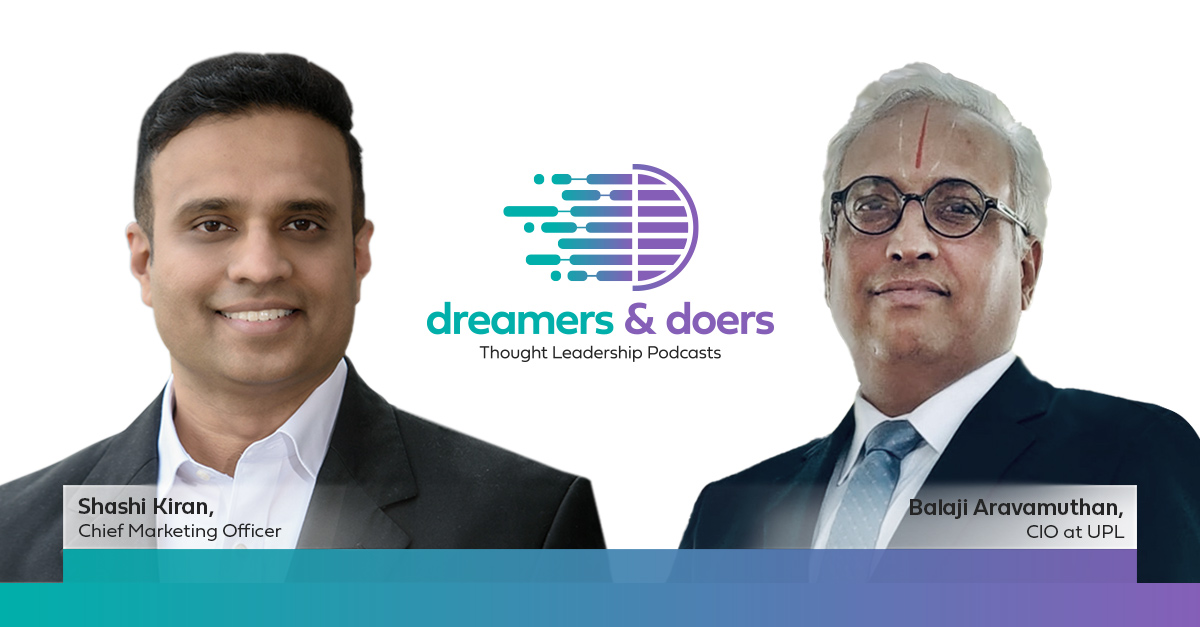Hybrid Workplaces and the Gen Z workforce: Podcast featuring UPL Ltd.

The world demands food in various forms. Sustainable agriculture is the way to get it. UPL Limited, formerly United Phosphorous, has made it their mission to be a premier global provider of total crop solutions designed to secure the world’s long-term food supply.
What began as an entrepreneurial initiative by their chairman Mr. Rajju Shroff more than 50 years ago in India, with what would be a little over $5000 in invested capital today, has flourished into a global corporate with over $5B in revenues and operations spanning over 138 countries!
I sat down to have a conversation with Balaji Aravamuthan, the Global CIO of UPL. Based out of Mumbai, the financial and film capital of India, Balaji and his team had navigated the company to adopt a hybrid workplace environment to navigate the ramifications of the pandemic. Our conversation focused on the “Gen Z” workforce entering into the corporate during these uncertain times.
With his experience, it is no surprise that Balaji would be a mentor to many. However, he also came across as a lifelong student himself with a penchant for continual learning. Technologist, Student, Mentor and Philosopher -that perhaps summed up Balaji.
You may listen to the podcast here:
https://www.aryaka.com/podcasts/student-never-bored/
Here are some top takeaways from the conversation with Balaji –
- “Gen Zs” and the Gig workers are causing an “Expectation shift” in the Enterprise
The new workforce is knowledgeable, highly demanding, inquisitive, and perhaps even attention deficit in their work ethic. They also thrive on digital experiences. They are not attuned to a 9-5 workplace environment, with a punch-in, clock-out mentality. Gig workers and freelancers are also proliferating the workplace blurring the boundaries and creating a diverse workplace environment in large companies with the pre-millennials, the millennials, and the Gen Ys. How should an organization give them purpose, motivate them and make them productive while being in tune with their experiential needs?
- Uberization of the Enterprise is around the corner
Traditional enterprise organizations have typically owned the entire value chain with their intellectual property and workforce with a significant portion of them being employees or consultants. However, if we look at a platform like Uber, they don’t typically own the cards nor are the drivers their employees. The pandemic caused a rapid re-think of the need for employees to be in the office and fueled hybrid workplace environments. The next logical step would be to create a dynamic environment where it would not just be the employee being anywhere, but rather anyone being an at-will worker, who is productive when they want to, and has a dynamic interface with the organization with different tiers of engagement and incentives.
- Consumerization of the workplace drives a greater need for data privacy and protection
The Gen Zs are used to sharing of their life on social media. That mindset needs to shift in the sensitive environments. At the same time, the workplace needs to accommodate the cultural shifts required by making it easier to ensure data privacy and protection. Governments are bringing in privacy-driven compliance requirements globally. CIOs and leaders across the company need to co-opt that and ensure that the right technology components are adopted to ensure strict data privacy, while at the same time fostering an inclusive environment.
- Hybrid workplaces will drive the need for rapid flexibility
For UPL, the pandemic caused an explosion of their “office” footprint. Their 40 manufacturing locations and about 130 offices worldwide suddenly became 20,000 offices as employees were forced to work from home. Capacity planning, security, collaboration requirements – all had to be rethought rapidly to ensure the employees were productive. While the organization adopted a safety-first norm towards its employees, UPL was categorized as an essential business by the government and had to maintain organizational productivity and efficiency in the greater national interest. This was a tough balancing act, but the team was able to build the flexibility to create the hybrid environment. Static capacity planning is a thing of the past, as organizations will need to be more dynamic and flexible – “capacity on-demand” is the key, whether it be networks, security or any other infrastructure element.
- Technology should enable human relationships, not isolate them into individuals
Mobile phones have caused humans to isolate themselves, glued to their phones, and perhaps unable to develop healthy relationships. The Gen Zs are particularly susceptible to social media relationships rather than social relationships. Balaji made a point about humans being social animals, who have become social media animals. While he is a technologist to the core, he also feels passionately that there needs to be a conscious effort to making technology work to foster human relationships at a deeper level and not be a substitute for it. The organizational leadership should recognize this and put the right cultural ethos in place to ensure that technology is an enabler and not a divisor.
